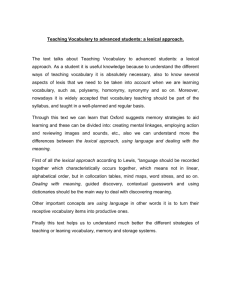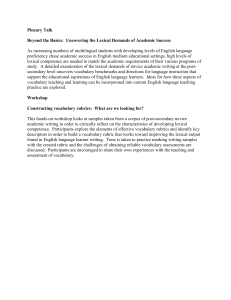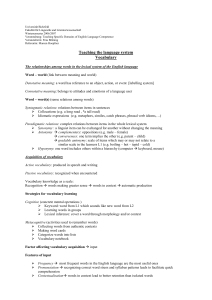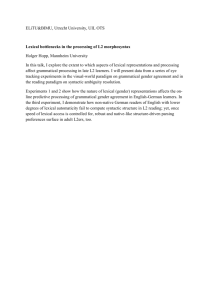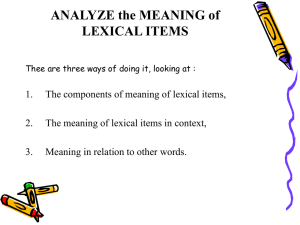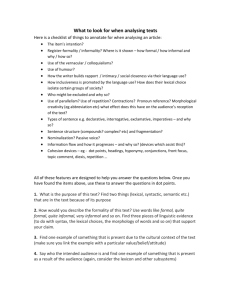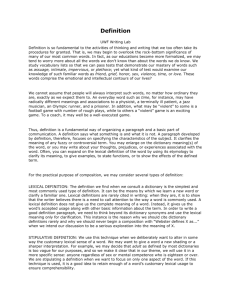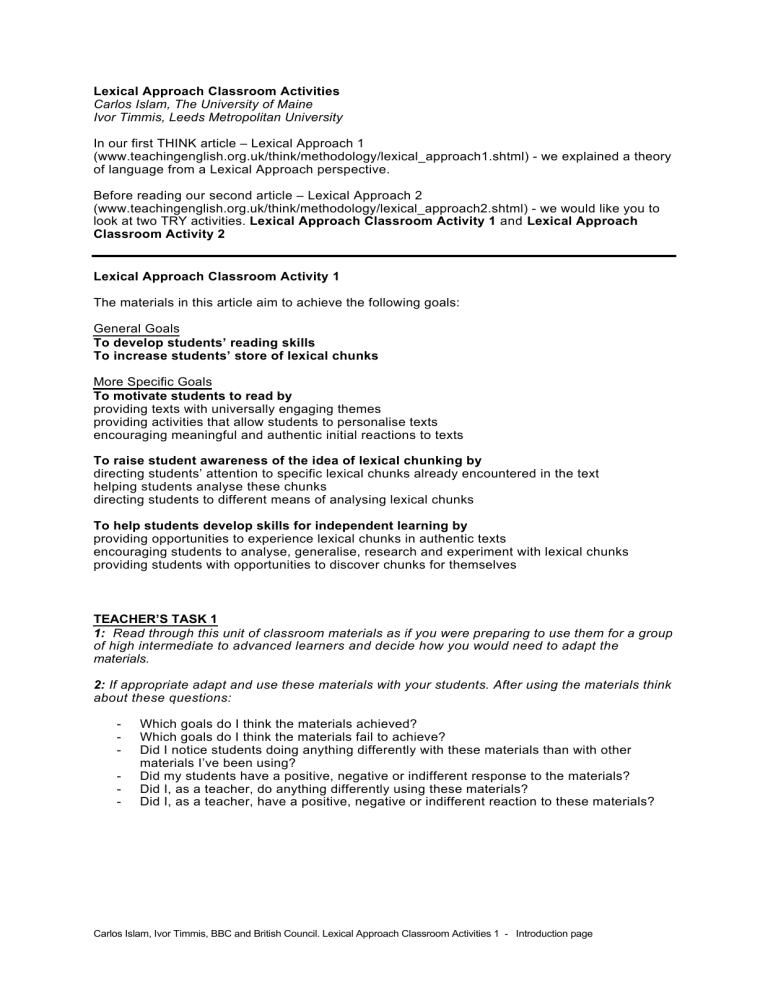
Lexical Approach Classroom Activities Carlos Islam, The University of Maine Ivor Timmis, Leeds Metropolitan University In our first THINK article – Lexical Approach 1 (www.teachingenglish.org.uk/think/methodology/lexical_approach1.shtml) - we explained a theory of language from a Lexical Approach perspective. Before reading our second article – Lexical Approach 2 (www.teachingenglish.org.uk/think/methodology/lexical_approach2.shtml) - we would like you to look at two TRY activities. Lexical Approach Classroom Activity 1 and Lexical Approach Classroom Activity 2 Lexical Approach Classroom Activity 1 The materials in this article aim to achieve the following goals: General Goals To develop students’ reading skills To increase students’ store of lexical chunks More Specific Goals To motivate students to read by providing texts with universally engaging themes providing activities that allow students to personalise texts encouraging meaningful and authentic initial reactions to texts To raise student awareness of the idea of lexical chunking by directing students’ attention to specific lexical chunks already encountered in the text helping students analyse these chunks directing students to different means of analysing lexical chunks To help students develop skills for independent learning by providing opportunities to experience lexical chunks in authentic texts encouraging students to analyse, generalise, research and experiment with lexical chunks providing students with opportunities to discover chunks for themselves TEACHER’S TASK 1 1: Read through this unit of classroom materials as if you were preparing to use them for a group of high intermediate to advanced learners and decide how you would need to adapt the materials. 2: If appropriate adapt and use these materials with your students. After using the materials think about these questions: - Which goals do I think the materials achieved? Which goals do I think the materials fail to achieve? Did I notice students doing anything differently with these materials than with other materials I’ve been using? Did my students have a positive, negative or indifferent response to the materials? Did I, as a teacher, do anything differently using these materials? Did I, as a teacher, have a positive, negative or indifferent reaction to these materials? Carlos Islam, Ivor Timmis, BBC and British Council. Lexical Approach Classroom Activities 1 - Introduction page School Days – student materials Reading 1 - Away Day Before you read 1: You are going to read a story about a young teenage boy from England. The boy has upset his parents. Read these sentences from the story and decide whether you think they come at the beginning, in the middle or at the end of the story. "I got slapped three times with the sole of her shoe. Three times. That was it. Then she left my room. She never said a word." 2: The story is called Away Day and the first sentence reads, “The only time I ever bunked off school, I was thirteen years old.” What do you think the story is about? Write down some guesses and share them with other students. As you read 1: As you read the story from the point of view of a teenage school boy, try to see pictures of the boy in your mind and decide if the boy deserved the punishment. After you read Reaction 1: Tell a partner, if you think the boy's punishment was appropriate and what you would have done if you were the parents. 2: Think about the following questions: How do you feel about the boy in the story? Why do you think the boy went with the twins? Why do you think the boy's mother reacted in the way she did? At the beginning of the story the author tells you the twins were always in trouble. Why do you think he tells you that? Discuss your thoughts about the questions in a small group. 3: Discuss your answers to the following questions with a partner: In paragraphs 1 and 2, what words tell you the housing estate is poor/working class? In paragraphs 3 and 4, how do you know the weather is hot and has been hot for some time? In paragraphs 5 and 6 the boy is becoming more and more frightened. What do you think frightens him? The boy was punished in the final paragraph. Was it the punishment he expected? Was the punishment effective? Carlos Islam, Ivor Timmis, BBC and British Council. Lexical Approach Classroom Activities 1 1 Away Day The only time I ever bunked off school, I was thirteen years old. It was break time and I hadn’t done my history homework. The Grant brothers convinced me to go with them. The Grants were twins and were always in trouble with the teachers. We went to the bike sheds at the back of the playground. The twins took two shiny new bikes and I took a rusty old bike, which was lying on the floor. We got on the bikes and headed straight for the school gates. I pedalled as fast as I could to keep up with the twins, but my bike was so big for me I had to pedal standing up. My heart was pounding, partly from the pedalling but mostly because I was scared of getting caught. We rode through the neighbouring housing estate. We raced between grey concrete houses with broken windows and graffiti walls, around broken bottles and over ripped magazines. It was the beginning of summer. The sky was clear, the sun had been out for days and the housing estate was quiet. We came out the other side of the estate onto a narrow country road. I’d never been this far from school or home on a bike before and I’d never been on this road. After about half an hour, we reached the River Lea. I didn’t know what we were doing here or where we were going. I was just following the twins. We hardly spoke and we definitely didn’t discuss what we were going to do. The River Lea ends in London and flows into the Thames. That was common knowledge. Mark led the way down to the riverbed. The long hot summer had completely dried the river. Older people said it was the hottest July they could remember. By lunch time we were hungry. The twins hadn't brought any lunch, so I offered to share mine. They took my melting Mars bar and left me with a sweaty cheese and tomato sandwich. The only thing I hated more than cheese was tomato. We explored the river, finding dead frogs, crushed beer cans and empty cigarette boxes, until we got bored. Mark got on his bike saying, "Let's find London." Off he went with us in his wake. He rode the left edge of the riverbed beside the grassy bank and Ian rode the right edge. I rode straight down the middle. I don't know why I didn't just go home. I had no idea how long it would take to get to London, but I was sure it was a long way and I knew I was going to get in trouble. Time flew by, I was getting tired and the sun was setting. We didn't seem to be any closer to London. As it got darker, the twins started to disappear ahead of me and I was beginning to forget what they looked like. Terrible thoughts entered my head. What would happen when I finally got back home. I could see my Mum screaming at me, pulling me by the hair and my Dad's angry face, very angry face. I couldn't see the twins any longer. I was becoming more and more frightened of being lost in the middle of nowhere than of my mum and dad. I began to hate the twins for getting me into this trouble although I knew it was really my own fault. The sun had set when I reached Tring, a small town I had never heard of. I could see the twins had stopped. They were talking to a couple out walking their dog. To my surprise seeing the twins was comforting. My panic began to disappear. We were in the couple's living room having a nice hot cup of tea when the police rang the doorbell. They were serious and treated us like suspects. "What are your names? Where do you live? Do your parents know where you are?" They telephoned our parents and drove us home. As the police talked to my mum and dad, I quietly slipped up to my bedroom. I heard the police drive away and my Mum thumping up the stairs towards my room. I got slapped three times with the sole of her shoe. Three times. That was it. Then she left my room. She never said a word. Carlos Islam, Ivor Timmis, BBC and British Council. Lexical Approach Classroom Activities 1 2 Look at the Language 1: Look at the lexical chunks below. All the expressions are from the story, Away Day. For each chunk try to write an equivalent in your language. Are they lexical chunks in your language too? Tell a partner about the lexical chunks in your language. Lexical chunks (frozen or fixed) in the middle of nowhere I had no idea Lexical Chunks (semi-frozen or semi-fixed) She never said a word I didn’t know where we were going I didn’t know what we were doing adjective plus noun partnerships/collocations (words that naturally go together) 2: What other nouns can you use after the adjective ‘shiny new’? e.g. shiny new shoes shiny new bike 3: What other nouns can you use after the adjective ‘broken’? e.g. broken heart broken window What nouns can’t you use after ‘broken’? e.g. broken house Examples of verb plus noun collocations (words that naturally go together) I didn’t do my homework. (do / homework) They were always in trouble with the teachers. (be / trouble) 4: Underline the weakest verb and noun collocation. Example: Exam take / pass / fail / study for / sit / revise homework do / forget / lose / prepare / finish / hand in trouble be in / expect / make / discover / get into / ask for Carlos Islam, Ivor Timmis, BBC and British Council. Lexical Approach Classroom Activities 1 3 School Days – student materials Reading 2 - My Best Friend Kyle As you read 1: Read the story about two friends who met at an American high school. The story is called My Best Friend Kyle. As you read decide why Kyle is the writer’s best friend. After you read Reaction 1: Explain to a partner: why you think Kyle is the writer’s best friend. who you admire most in this story, Kyle or the writer. 2: Retell the story to a friend in another class and ask them why they think Kyle was the writer’s best friend and who they admire most. Look at the Language 1: Read the story again and make a list of collocations you think are useful to know. Using English 1: 2: 3: 4: Think of a time you were punished by your parents. Tell a partner why you were punished and how you were punished. With your partner decide if the punishment was fair. Write about the time you were punished for other students in your class to read. OR 1: Think about a time you helped a friend. 2: Tell a partner who your friend was and how you helped your friend. 3: Write about the time you helped your friend for another friend to read. Carlos Islam, Ivor Timmis, BBC and British Council. Lexical Approach Classroom Activities 1 4 My Best Friend Kyle One day, when I was a first year in high school, I saw a kid from my class walking home from school. His name was Kyle. It looked like he was carrying all of his books and I thought to myself, "Why would anyone bring home all his books on a Friday? He must really be a nerd." I had quite a weekend planned (parties and a football game with my friends tomorrow afternoon), so I shrugged my shoulders and went on. As I was walking, I saw a bunch of kids running toward him. They ran at him, knocking all his books out of his arms and tripping him so he landed in the dirt. His glasses went flying, and I saw them land in the grass about ten feet from him. He looked up and I saw this terrible sadness in his eyes. My heart went out to him. So, I jogged over to him and as he crawled around looking for his glasses, I saw a tear in his eye. As I handed him his glasses, I said, "Those guys are jerks. They really should get lives." He looked at me and said, "Hey thanks!" There was a big smile on his face. It was one of those smiles that showed real gratitude. I helped him pick up his books, and asked him where he lived. As it turned out, he lived near me, so I asked him why I had never seen him before. He said he had gone to private school before now. I would have never hung out with a private school kid before, but we talked all the way home, and I carried some of his books. He turned out to be a pretty cool kid. I asked him if he wanted to play a little football with my friends. He said yes. We hung out all weekend and the more I got to know Kyle, the more I liked him, and my friends thought the same of him. Monday morning came, and there was Kyle with the huge stack of books again. I stopped him and said, "Boy, you are gonna really build some serious muscles with this pile of books everyday!" He just laughed and handed me half the books. Over the next four years, Kyle and I became best friends. When we were seniors, we began to think about college. Kyle decided on Georgetown, and I was going to Duke. I knew that we would always be friends, that the miles would never be a problem. He was going to be a doctor, and I was going for business on a football scholarship. Kyle was valedictorian of our class and he had to prepare a speech for graduation. I was so glad it wasn't me getting up there to speak. On graduation day, I saw Kyle. He looked great. He was one of those guys that really found himself during high school. He filled out and actually looked good in glasses. He had more dates than I had and all the girls loved him. Boy, sometimes I was jealous. Today was one of those days. I could see that he was nervous about his speech. So, I smacked him on the back and said, "Hey, big guy, you'll be great!" He looked at me with one of those looks (the really grateful one) and smiled. "Thanks," he said. As he started his speech, he cleared his throat, and began. "Graduation is a time to thank those who helped you make it through those tough years. Your parents, your teachers, your siblings, maybe a coach, but mostly your friends. I am here to tell all of you that being a friend to someone is the best gift you can give them. I am going to tell you a story." I just looked at my friend with disbelief as he told the story of the first day we met. He had planned to kill himself over the weekend. He talked of how he had cleaned out his locker, so his Mom wouldn't have to do it later, and was carrying his stuff home. He looked hard at me and gave me a little smile. "Thankfully, I was saved. My friend saved me from doing the unspeakable." I heard the gasp go through the crowd as this handsome, popular boy told us all about his weakest moment. I saw his mom and dad looking at me and smiling that same grateful smile. Not until that moment did I realize its depth. Carlos Islam, Ivor Timmis, BBC and British Council. Lexical Approach Classroom Activities 1 5
